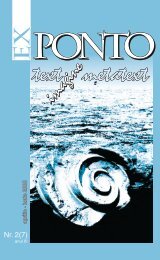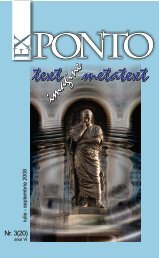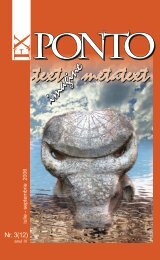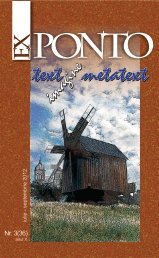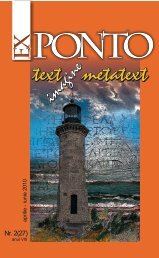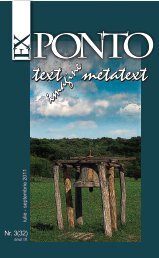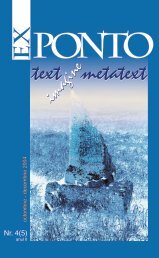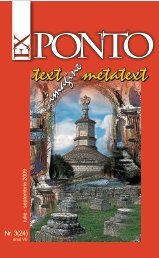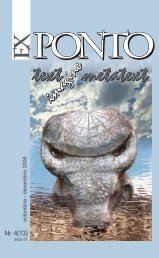Nr. 3 (28) anul VIII / iulie-septembrie 2010 - ROMDIDAC
Nr. 3 (28) anul VIII / iulie-septembrie 2010 - ROMDIDAC
Nr. 3 (28) anul VIII / iulie-septembrie 2010 - ROMDIDAC
Create successful ePaper yourself
Turn your PDF publications into a flip-book with our unique Google optimized e-Paper software.
literatură universală<br />
CRISTINA-MIHAELA LAZĂR<br />
The Japanese Madeleine: Memory and<br />
Trauma in Haruki Murakami’s novels<br />
I<br />
f there were a single statement that would run through Murakami’s fiction,<br />
it would be a film line: This is the stuff dreams are made of, or to adapt it,<br />
Memory is the stuff dreams are made of. The border between sleep and<br />
waking life often ends up in a hazy confusion, and most of the times, it<br />
leads to a dissociation of identity and recurrence of Doppelgänger imagery.<br />
As in Proust, memories are triggered by an element tinged with emotion<br />
and psychological pain, leading back to a deep-seated moment of trauma,<br />
unleashed from the “id” with unrecoverable damage and social scars.<br />
Scars that, eventually, allow a Munch-like scream of loneliness and void<br />
to hover over the characters and their Japanese silences.<br />
Proustian territory is a beaten track in most of Murakami’s novels,<br />
but it is only made obvious and somehow paid tribute to in Hard-Boiled<br />
Wonderland and The End of the World. The protagonist is made to wander<br />
a long and dark corridor, where the odour of cologne stirs a strange sense<br />
of nostalgia in him and prompts an exploration of the unknown recesses of<br />
his mind. When the woman who is walking him down that corridor seems<br />
to say the word Proust, the “I” tries to understand the connection between<br />
that corridor and Proust. He can only come up with the explanation that<br />
the corridor is as long as a book by Proust, but no literary gimmick can<br />
take away the fact that a link had been more or less indirectly established<br />
between Proust and the dark, long corridor of memory. In this case, it was<br />
a smell that unloosed the hidden nooks of memory.<br />
Yet Murakami’s favourite “Madeleine” is, by far, music. Norwegian<br />
Wood, for instance, opens with the protagonist, Watanabe Toru, seated<br />
in a plane and waiting to land on Hamburg airport. His personal trauma is<br />
reactivated while listening to a muzak orchestra rendition of the Beatles’<br />
Norwegian Wood, which sends him back to a meadow in Kyoto, and<br />
brings back the memory of his girlfriend Naoko. The evoked image is<br />
laden with romantic clichés, as the two lovers make promises to each<br />
other and indulge in the illusions and naïveté of youth. What is interesting<br />
is that Naoko’s greatest wish is for Toru to always remember her. The<br />
romantic dream is, however, broken by the postmodern fragmented self.<br />
Paradoxically, eighteen years from that moment, Toru confesses he can<br />
Ex Ponto nr.3, <strong>2010</strong><br />
167





